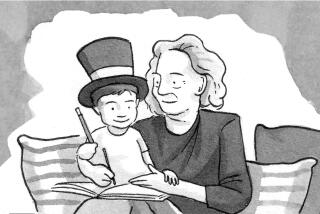Staying afloat while learning a new language
Buenos Aires
A few years ago, during my first attempt at learning a second language, I took a weeklong Spanish course in Antigua, a tiny colonial town near Guatemala City, the capital of this Central American country. In a stucco building on a cobblestone street, I learned how to conjugate verbs and construct basic sentences in the present and future tenses. I tried rolling my Rs, tried to pronounce my Js as if they were Hs caught in the back of my throat.
But five four-hour lessons do not a Spanish speaker make. After I returned to my English-speaking environment in the U.S., the lessons faded. So did my desire to study Spanish at home.
FOR THE RECORD:
Translations: An illustration accompanying the article on learning languages overseas in the Jan. 6 Travel section included the German phrase “Ich bin verloren” as a translation of “I’m lost.” That is a more metaphorical translation of the phrase, indicating a state of distress. “Ich weiss nicht wo ich bin” is the correct phrase for not knowing one’s whereabouts.
Since then I’ve been an on-again, off-again language student, popping in and out of classes in Europe and Latin America.
Some experts say you don’t need to go abroad to learn a language.
“Successful language learning is influenced and constrained by a person’s desire to learn a language, the school curriculum and the value society places on speaking another language,” says Rachael Sills, editor of Velázquez Spanish and English Dictionary. “Study abroad addresses only the first factor, since only the most motivated students choose to go abroad.”
But the idea of immersion and travel is too powerful an allure to pass up. If you’re serious about learning a language abroad, you can learn from my many mistakes. And you can learn that my mistakes -- or at least my reaction to them -- are part of the problem.
All agree: It’s tough
Even experts don’t agree on the best way to learn a language. Some say it can be done in a classroom; others say that full immersion is the key. Still others say some combination of the two is best.
What they do agree on is the dedication it requires to master another tongue.
“A language is a complex system, and you’re not going to learn it overnight and you’re not going to learn it easily,” says Susan Gass, university distinguished professor of linguistics and languages at Michigan State University in East Lansing and the author of books related to second-language acquisition. “It’s like lots of skills -- say, tennis or any sport. It takes a lot of work and a lot of trying to figure it out.”
Gass had her own struggles learning Italian when she was a high school student. Like me, she had at least one false start, hers in Italy and mine in Guatemala.
Surrounded by three volcanoes (one of them, Fuego, is active), Antigua, Guatemala, a town of only 30,000, is home to more than 30 Spanish language schools. As part of a language immersion program at Spanish Academy Sevilla, I lived for a week in the spotless home of a woman named María and her husband and child.
For $75, the family provided a private room, shared bath and three home-cooked meals every day for a week. The school charged $100 for a week of private, four-hour classes.
As is the case with most language immersion classes, mine was taught entirely in Spanish.
Speaking and listening in the local language is the basis of language immersion. The less English you speak, the faster the language is supposed to sink in.
Still, I was frustrated by my inability to understand verbal directives. When my instructor’s message failed to get through to me, she used gestures.
School administrators urged us to use our new language outside the classroom as much as possible.
In that, I failed miserably.
María was a worldly woman who enjoyed practicing English with her boarders. Her English improved during my stay. My Spanish was an entirely different story.
This is a common pitfall for students: When you’re struggling to communicate in the local language, well-meaning locals may respond in English and unwittingly sabotage the learning process.
Which raises the issue of whether we even need to learn another language, especially if English is the language of business.
“We absolutely expect people to converse with us in English -- and we’re in their country,” says Dawn Bratsch-Prince, professor of Spanish and chairman of the department of world languages and cultures at Iowa State University in Ames. “Many people don’t feel compelled to make the effort [to speak another language]. Then we wonder where ugly American or the arrogant American stereotypes come from.”
By trying, you reach out to other cultures in a way that “builds a relationship across different worlds and gives you a window onto the culture,” says Jessica Gilbert, assistant vice president of client services at Global Lead Management Consulting, a Cincinnati-based company. “Even if you’re learning, you’ve still made the attempt to reach out to the host culture.”
I couldn’t spend time in Spanish-speaking countries without making another effort to reach out.
Red-faced
The Amazonas School in Quito, Ecuador, opened its doors to a handful of students in 1989.
These days, it averages 500 foreign students a year, most from Europe (England, Germany and the Netherlands are prime markets), although Spanish-speaking wannabes pop in regularly from the United States, Canada and as far away as South Africa, South Korea and the Czech Republic.
The school offers three language learning options, depending on how much time one has.
As part of Amazonas’ Home-Stay program, I lived for a week in the three-story home of Dr. Jaime Yépez Castro and his wife, Inés María Darquea de Yépez. During their six-year affiliation with Amazonas, the retired couple have hosted scores of students from all over the world.
One night, during a visit by a local married couple, I greeted the woman with “Me gusta mucho” (I like you very much), rather than “Mucho gusto” (Nice to meet you), which is what I’d meant to say. A heated protest by the woman’s husband and the subsequent chuckles left me gun-shy. I didn’t practice Spanish for the rest of the trip.
And that’s part of the problem with learning language as an adult. We don’t like to be wrong.
“The biggest obstacle for the adult learner is the fear of looking foolish,” Gilbert says. “As adults, we must always know what we are talking about, but when you are learning, you are going to make mistakes. You need to accept that. . . . It’s the only way you’re going to learn.”
Two years later, I hopped back on the caballo (horse) at Instituto Andalusí in Málaga, Spain. Four hours of daily group lessons cost a minimum of about $400 per week, based on a two-week stay, including accommodation.
I took a class with seven Dutch and German students. The Europeans seemed to soak up lessons faster.
My desire to explore the city always overruled my desire to do homework, but that wasn’t my most obvious shortcoming.
As it turned out, I was the only monolingual person in class. Most of my European counterparts were half my age and spoke at least three times as many languages. So it made sense that they were doing better than I; some experts say that acquiring a third or fourth language is easier if you’ve already made the successful transition to a second language.
I marveled at their ability to shift linguistic gears. I envied the cultural multiplicity.
During a break between classes, a 20-year-old Dutch woman turned to me. Blue eyes blinking innocently, she spoke in textbook English. “How many languages do you speak?”
“Only one,” I said.
After my confession, she asked, “How can you survive with only one language?”
Easily. I had up to this point. I just didn’t want to anymore.
Progress at last
When I returned to the United States, instead of reinserting myself in an English-only environment, I packed my bags and moved to Buenos Aires.
The dialect is different here. The accent, unlike any I’ve heard. But I’m studying with a private tutor twice a week. Mingling with locals every day. The Rs are rolling. The conjugations coming more easily by the day. Believe it or not, I’m finally learning to speak Spanish.
I will occasionally look foolish, and I will make mistakes. But they say that people who choose to learn a new language are risk takers by nature, and that I am.
Elliott Hester is the author of “Plane Insanity” and “Adventures of a Continental Drifter.” Contact him at www.elliotthester.com. Times staff writer Catharine Hamm contributed to this report.
More to Read
Sign up for The Wild
We’ll help you find the best places to hike, bike and run, as well as the perfect silent spots for meditation and yoga.
You may occasionally receive promotional content from the Los Angeles Times.






